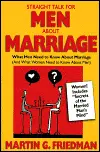Sharing Power in Marriage
By Marty Friedman
You're paying the bills, thinking about nothing in particular, when it suddenly hits you, "Why am I the one who always has to do this? Keep asking questions like that and you'll soon be part of a vast national experiment to share power in marriage. Every husband and wife must determine how to share power; some just do it more consciously than others. Creating equality in marriage may sound easy, yet it is one of the primary challenges in 21st Century marriages, because unresolved power issues can tear the fabric of a relationship.
Husbands and wives once embraced very clear roles: men exercised their power in the community, while women made critical decisions about children and the households. Today, some people in traditional marriages may step into traditional roles like those, finding them a cozy, warm fit. Many more couples are attempting to share power equally. They wrestle with who should do everyday duties such as buying groceries; cooking the meals; driving the car; cleaning the house; disciplining the kids; and making investment decisions. Some tasks seem to be done more by men (mowing the lawn, taking out the trash), and some more by women (mopping the kitchen floor, organizing the kitchen), but everybody must make up their own rules.
There's more to power-sharing than gender roles. First, it's helpful to know that power struggles over simple tasks and responsibilities are usually more about you than the task involved. It's important to not get locked into useless gender roles or tasks that you hate doing. What matters most is how you feel about doing it and what's behind the feeling. Just because you resent having to do something doesn't necessarily mean that your spouse is uncaring and lazy. Power struggles usually mirror unconscious reflections of one's parents' relationship, and they may bring up old feelings of childhood powerlessness, anger and resentment.
It's easy to see power issues as we notice our everyday tasks, but the struggle over power often pervades more subtle aspects of marriages. A woman might feel less powerful if her husband refuses to listen or entertain her point of view, and a man might feel powerless because he is continually criticized and diminished. Changing these patterns is tough. The more we look at the brave new world of full equality in marriage, the more we see that power sharing is truly difficult and much more subtle than it seems. Merely dividing up household tasks may get the work done with less friction, but it won't put an end to power issues in your marriage.
Ignoring power imbalances isn't the answer either. In fact, if you don't examine a power issue, it will cause more trouble for you, causing you to feel cranky, misunderstood and taken for granted. It may enter into the bedroom, kitchen or even the car; wherever you interact with your spouse there's the potential of a power differential.
It's important to do the inner work necessary to feel powerful and complete in your own right before you accuse your partner. The less inwardly powerful you feel the less likely you'll be able to share power equally with your spouse. Conversely, the more you feel alright about yourself, the more you'll create positive discussions that begin to change the power balances in your marriage. Resolve to discuss the balance of power in a positive, respectful way rather than vilifying your partner. Imagine shouting, blaming and criticizing, "You never go grocery shopping! Why do I have to do all the work? Now, imagine a different discussion: "I need to ask for help. I've been doing most of the grocery shopping and I'd love to have you pitch in on it. Can we talk about how to get it done?
Achieving a marriage based on equality is a great, worthy pursuit, but couples who want to share power equally would do well to remember the "paradox of power : power flows from the inside out. No matter how wellyou balance tasks and responsibilities, you won't feel powerful unless you feel it from the inside.
|
 For many years, Marty Friedman, author of "Straight Talk for Men About Marriage-What Men Need to Know About Marriage (And What Women Need to Know About Men) For many years, Marty Friedman, author of "Straight Talk for Men About Marriage-What Men Need to Know About Marriage (And What Women Need to Know About Men) " taught corporate managers how to create good relationships at work before writing and speaking about men and marriage. He is regularly interviewed on radio and television, and speaks to organizations about communication, men, relationships and marriage. " taught corporate managers how to create good relationships at work before writing and speaking about men and marriage. He is regularly interviewed on radio and television, and speaks to organizations about communication, men, relationships and marriage.
|
Resources
Sharing Housework
Romantic Date Ideas
Marriage without Criticism
20 Tips to Keep Love alive
Stonewalling
About Us-
Contact Us -
Privacy Policy©2023 TheParentVine.com a brand owned by GADL Enterprises, LLC. All rights reserved.
TheParentVine.com earns commissions on products sold.


 For many years, Marty Friedman, author of "Straight Talk for Men About Marriage-What Men Need to Know About Marriage (And What Women Need to Know About Men)
For many years, Marty Friedman, author of "Straight Talk for Men About Marriage-What Men Need to Know About Marriage (And What Women Need to Know About Men)
